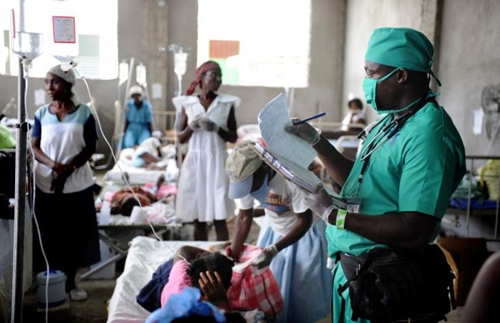13 June 2016. Food and Drug Administration approved for marketing the U.S. a vaccine to prevent cholera for travelers to regions in the world where contaminated food or water is causing the disease. Vaxchora by PaxVax Inc. in Redwood City, California is the first vaccine approved by the agency to prevent cholera.
According to World Health Organization, from 1.4 to 4.3 million cases of cholera occur each year, killing 28,000 to 142,000 people. The disease is caused by Vibrio cholerae bacteria, found in contaminated food and water, particularly in low-resource regions with weak public sanitation facilities, and in humanitarian crisis areas, where normal water supplies and sanitation systems are disrupted. Cholera is characterized by diarrhea and vomiting, which if severe, can lead to dehydration.
Vaxchora is an oral vaccine, distributed as a powder, mixed with bottled water, and taken 10 days before travel to regions experiencing cholera. The vaccine has live, but weakened cholera bacteria from a subgroup labeled 01, which according to WHO accounts for a majority of cases. The original research for Vaxchora was conducted at University of Maryland medical school by microbiologists Myron Levine and James Kaper, and licensed to PaxVax for development.
The vaccine was tested in a series of clinical trials, including a late-stage study with nearly 200 adult healthy volunteers in the U.S. Participants in the trial were given either Vaxchora, code-named at the time PXVX0200, or a placebo, then exposed to Vibrio cholerae bacteria. The results show 10 days after taking the vaccine, 90 percent participants were protected against cholera when exposed to the bacteria. Likewise, 90 days after the vaccine, 80 percent were protected. Participants receiving the placebo were given immediate care with antibiotics and fluid replacement.
In other clinical studies in the U.S. and Australia, says FDA, healthy participants given the vaccine developed antibodies indicating protection against cholera. Several trials tested Vaxhora’s safety, with tiredness, headache, abdominal pain, nausea, vomiting, lack of appetite and diarrhea as the most common side effects. The vaccine has not been tested, however, in people already exposed to cholera bacteria, or with other bacterial sub-types.
FDA gave Vaxchora priority review and fast-track status to expedite its review through the agency. In addition, the vaccine received special priority review consideration to encourage development of treatments and vaccines for tropical diseases often neglected by drug companies. The company expects to have Vaxchora on the market during the third quarter of 2016.
Read more:
- Process Devised to Quickly Isolate Bacteria in Lab Samples
- Fast, Inexpensive Test for Water Bacteria Developed
- 566 New Drugs in Pipeline for Orphan Diseases
- Allergan, AstraZeneca Partner on Drug-Resistant Bacteria
- Bacterial Bonding Technique Devised to Simplify Vaccines
* * *


 RSS - Posts
RSS - Posts
You must be logged in to post a comment.